An ‘à la carte’ rather than ‘pick n’ mix’ offer. This was one of the many brilliant, incitive reflections from our workshop discussions at Advance HE’s Teaching and Learning Conference this year. The University of Manchester is setting out a bold vision for a more flexible future. We followed on from Dan George’s keynote on flexible learning, with an active and reflective workshop on how flexible learning might be feasible for higher education (HE).
We had practically unanimous agreement that on-campus learning is the most common approach to teaching in HE, along with on-campus being seen as the preference for learning in HE. There was also almost unanimous agreement that we had all encountered this traditional form of education in our own learning experiences and that the way it ‘just feels right’ means we are more likely to gravitate towards it. This was not a settling or comfortable realisation for our participants – and precisely why we wanted to engage in critical discussion on flexible learning with colleagues across the sector.
We need to identify the elephant in the room. And that elephant is that the majority of HE professionals have not experienced flexible learning in their own education histories.
So why should anyone inexperienced with flexible learning want to embrace – and dare we say, design – this, in their programmes of study?

